
Council encourages residents to rethink their pumpkins this Halloween
Halloween may be a time for spooky fun, but one of the scariest parts of the season is the amount of waste it generates - particularly from pumpkins. Each year in the UK, an estimated 12 million pumpkins are grown, bought, carved, and then thrown away.
This year, Forest of Dean District Council is encouraging residents to celebrate more sustainably – by eating as well as carving their pumpkins.
For any leftover pumpkin that cannot be used in the kitchen, residents are reminded that pumpkins can be recycled through the council’s weekly kerbside food waste collections. Whole pumpkins can be left on top of food waste caddies, or they can be cut up and placed inside the caddy. Decorations and candles must be removed first.
Councillor Andy Moore, Portfolio Holder for Waste and Recycling at Forest of Dean District Council, said:
“Pumpkins and gourds make biodegradable seasonal decorations that are better for the environment than plastic ones. But once Halloween is over, too many are ending up in the bin. We’re encouraging residents to think of their pumpkin as food as well as a decoration – they’re nutritious and there are lots of ways they can be used.
“If you’re planning to eat your pumpkin, you could try one of the smaller varieties bred for flavour rather than carving. Once carved, pumpkins start to deteriorate quickly especially when left outdoors, so if you don’t have time to cook with them straight away, decorating instead of carving is a simple way to keep them fresh for much longer. Whole pumpkins can last for months and be enjoyed at your convenience after Halloween.
“While food waste peaks at times such as Halloween and Christmas, it’s a year-round issue. Analysis of the black bins in our district shows that a quarter of the rubbish the council collects from homes by weight is food, half of which is still in its original packaging. Globally, a third of all food produced is wasted, at a huge cost to our planet.”
Pumpkins are full of nutrients and an excellent source of beta-carotene, fibre, vitamins C and E and iron. Apart from the stalk, every part of a pumpkin is edible – it can be made into soup, added to risottos, curries and pasta dishes, or used as a sweet ingredient in desserts, cookies and cakes.
For pumpkins that aren’t used in cooking, residents are encouraged to compost them at home or recycle them through their kerbside food waste collection. All food waste collected in the Forest of Dean is treated using anaerobic digestion - a process that produces biogas to generate energy and creates a nutrient-rich fertiliser for farmland.
The council is also reminding residents not to leave pumpkins out for wildlife. While well-intentioned, this can be harmful. Pumpkins are not a natural food source for many animals, and in large quantities can cause illness. In particular, the Woodland Trust warns that pumpkins can make hedgehogs unwell, potentially causing dehydration, stomach upsets and other issues. This is especially dangerous as hedgehogs need to build up fat reserves ahead of hibernation.
For pumpkin decorating ideas, visit: https://hubbub.org.uk/10-no-carve-ideas-to-decorate-your-pumpkin
Food waste caddies can be ordered online: www.fdean.gov.uk/orderabin
Ideas on how to cook pumpkins: https://issuu.com/hubbubuk/docs/recipebook_pumpkinrescue_a4_oct2022?fr=sMTExNjc4MDkyNDM
